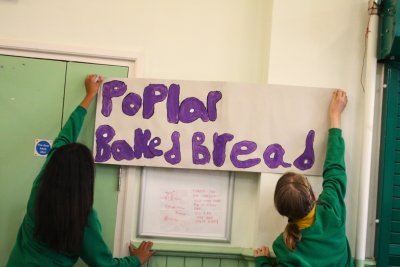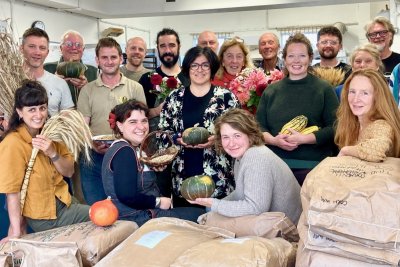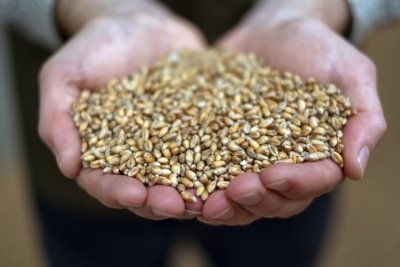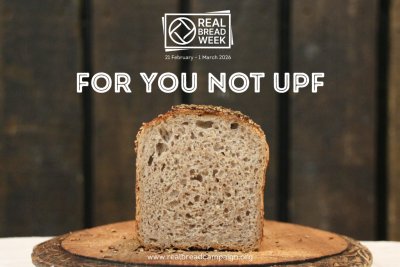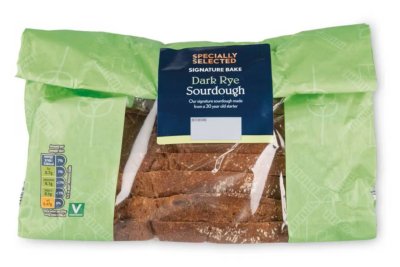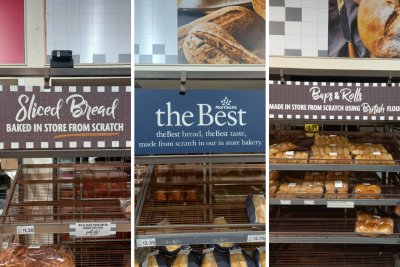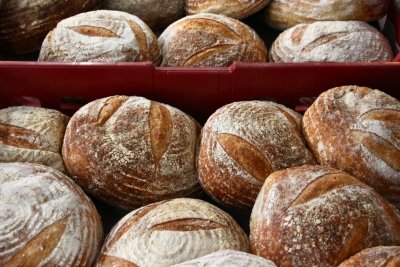 Has your Scottish naan overdone the botox?. Credit: Chris Young / www.realbreadcampaign.org CC-BY-SA-4.0
Has your Scottish naan overdone the botox?. Credit: Chris Young / www.realbreadcampaign.org CC-BY-SA-4.0

Report highlights ‘bread’ related concerns
Composition and labelling issues noted by annual food standards review.
On 19 June 2025, the Food Standards Agency (FSA) and Food Standards Scotland (FSS) published ‘Our Food 2024: An annual review of food standards across the UK’.
Issues highlighted by the 136 page report include allergen and other labelling non-compliance around the UK. The report authors ‘urge businesses to pay greater attention to the accuracy of labelling, especially for allergens.’ The FSS reported illegal levels of an artificial preservative in 20% of sampled flatbreads.
Scotland
Based on previous sampling and issues identified by local authorities, from July 2023 to June 2024, the FSS collected samples from retailers, manufacturers and caterers and tested for authenticity, composition, presence of allergens and contaminants.
One of the previously-identified issues on which the FSS focused was excessive use of propionic acid (e.g. as calcium propionate) as a preservative in flatbreads, such as naan, pitta and tortillas. The FSS found that levels of propionic acid exceeded legal limits in 16 (20%) of the 79 samples tested.
Rest of the UK
The FSA collected samples of 13 food product types across England, Wales and Northern Ireland from July 2024 to September 2024 and tested for the presence of allergens and contaminants, authenticity, composition, labelling accuracy, and compliance with food information standards.
Only nine of the 35 ‘bread’* samples tested (26%) were compliant, ‘resulting in the lowest compliance rate among the commodities tested this year.’ Twenty-six samples failed to comply with labelling requirements outlined in regulations and / or industry guidance. These were mostly errors in presentation of nutritional information or durability (e.g. best before, use by date). More worrying were allergens not being declared in accordance with regulations or industry guidance. In two samples, an undeclared allergen (milk) was detected.
The report highlighted that more samples from supermarkets and other large food businesses were compliant (86%) than those collected from small food businesses (73%). It noted, however, that the ‘results should not be seen as representative of the food industry as a whole’
*The FSA did not differentiate between industrial dough products and bread.
Wider issues
Key findings of the report included:
- 21% of households in Scotland were classified as food insecure in January 2024.
- 21% of households in England, Wales and Northern Ireland were food insecure in July 2024.
- People – notably children – across the UK are not meeting certain dietary health goals, with marked health inequalities between people in the most deprived and least deprived areas.
- The UK imports roughly two-fifths of its food.
- Food and feed imports to the UK grew by 9.5% in 2024, reaching the highest volume in a decade.
- Occupied food standards posts in England, Wales and Northern Ireland have fallen by 43.8% since 2010/11.
- 20% of food safety roles in Scotland were unavailable or vacant at the end of 2024.
Consumer concerns
From a given list in December 2024, the top five food-related concerns for people in Scotland were:
- food prices (90%)
- ultra processed food (UPF) or over-processing of food (81%)
- food poverty and food inequality (80%)
- the ‘healthiness’ of people’s diets in general (75%)
- the safety of food imported from outside the UK (74%)
From a given list in July 2024, the top five food-related concerns for people in the rest of the UK were:
- food prices (69%)
- food waste (59%)
- the amount of sugar in food / the quality of food (both 57%)
- the amount of food packaging (55%)
- animal welfare / being able to eat healthily (both 52%)
With the exception of animal welfare, these were the same issues reported (in a slightly different order) as the top five concerns in January 2024.
Real Bread Campaign: Finding and sharing ways to make bread better for us, our communities and planet.
Sustain
The Green House
244-254 Cambridge Heath Road
London E2 9DA
020 3559 6777
sustain@sustainweb.org
Sustain advocates food and agriculture policies and practices that enhance the health and welfare of people and animals, improve the working and living environment, promote equity and enrich society and culture.
© Sustain 2026
Registered charity (no. 1018643)
Data privacy & cookies
Icons by Icons8
